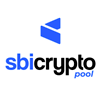Mining Pools
Mining pools combine the computational power of multiple miners to increase the likelihood of successfully mining Bitcoin. Find reputable mining pools, compare their features, and join a community dedicated to securing the Bitcoin network.

Ocean
Ocean is a new mining pool launched by Bitcoin OGs and focused on non-custodial payouts and decentralization. Built with the ethos of Bitcoin in mind, it provides transparent block templates, miner verification, and direct-to-wallet payouts without trusting the pool operator. Ocean is redefining trust-minimized mining.

Foundry USA
Foundry USA is currently the leading Bitcoin mining pool in terms of hashrate share. Based in the United States and backed by Digital Currency Group, Foundry places a strong emphasis on regulatory compliance, institutional-grade infrastructure, and decentralization within North America. It has become a go-to option for large-scale industrial miners due to its reliability and transparency, offering real-time monitoring and payout transparency. The pool operates on a FPPS (Full Pay Per Share) model, providing consistent rewards to miners.

Antpool
Operated by Bitmain, Antpool is one of the oldest and most established Bitcoin mining pools in the ecosystem. While it supports multiple cryptocurrencies, its Bitcoin pool remains one of the most dominant globally. Known for its advanced dashboard and flexible payout schemes (including PPLNS and PPS+), Antpool offers miners robust tools, including hash rate distribution and earnings tracking. However, centralization concerns arise due to its ties to hardware manufacturing giant Bitmain.

F2Pool
Founded in 2013, F2Pool is a globally distributed mining pool with a multilingual interface and excellent uptime. Though it started in China, it has since decentralized its infrastructure across multiple regions. F2Pool supports many cryptocurrencies but remains one of the largest Bitcoin mining pools. Its PPS payout system ensures steady revenue, even during high difficulty periods. However, some users report higher fees compared to other pools.

ViaBTC
ViaBTC offers a full-suite mining ecosystem including a cloud mining platform and a mining pool with a strong Bitcoin focus. Based in China, the pool is known for its high-performance servers, low latency, and both PPS+ and PPLNS payment options. It's a popular choice for miners who want more control over their mining strategy. The platform also integrates with wallets and other services to make the mining experience seamless.

Luxor Mining
Luxor is a U.S.-based mining pool designed for enterprise and retail miners who care deeply about decentralization and operational transparency. Their philosophy aligns well with Bitcoin’s ethos, offering open APIs, mining telemetry, and robust documentation. Luxor stands out with its specialized mining software and analytics platform, which empowers miners to make informed decisions and optimize efficiency.

Binance Pool
Binance Pool is the mining arm of the world’s largest crypto exchange. While its core focus is tied into Binance’s broader ecosystem, the pool itself offers highly competitive fees, streamlined account integration, and powerful infrastructure. Although efficient, its centralized nature and ties to a large exchange may raise concerns among Bitcoin purists.

Braiins Pool
Braiins Pool, known historically as Slush Pool, was the first-ever Bitcoin mining pool and is widely respected for its contribution to open-source mining software and Bitcoin’s decentralization. Operating out of the Czech Republic, Braiins offers a clean UI, detailed analytics, and full integration with the open-source Braiins OS. It’s a favorite among technically savvy miners and small-scale operations that value control and openness.

EMCD
EMCD is an emerging European mining pool focused on delivering a smooth user experience with minimal downtime and diverse payment methods like PPS+ and SOLO. It provides unique offerings like merged mining and access to hosting facilities. EMCD is gaining traction with small to mid-sized miners who want an alternative to large, centralized pools.

Poolin
Despite facing some operational challenges in the past, Poolin remains one of the largest Bitcoin mining pools. Its infrastructure is powerful, and it offers flexible payout systems like FPPS and PPLNS. Based in China, Poolin supports a variety of digital assets but continues to focus heavily on Bitcoin. It's a viable option for miners seeking strong infrastructure and liquidity.

SBI Crypto
SBI Crypto is part of the Japanese financial giant SBI Holdings, bringing a traditional finance approach to Bitcoin mining. It operates large-scale mining facilities and offers a public mining pool that emphasizes regulatory compliance, infrastructure quality, and transparency. Though not the most popular pool, it appeals to institutional miners and those seeking enterprise-level partnerships.

BTC.com
BTC.com is a veteran in the mining pool space, originally backed by Bitmain. It offers a user-friendly interface and a PPS+ payout scheme. While its prominence has faded slightly in recent years, BTC.com remains a trusted name for consistent payouts and effective management tools for both small and large miners.

Rawpool
Rawpool is a China-based mining pool with a smaller market share but strong uptime and clear reward systems. It caters primarily to domestic miners, with decent transparency and bilingual support. Although not heavily marketed internationally, it provides reliable operations and low fees.

SpiderPool
SpiderPool is an Asia-based mining pool known for speed and low-latency connections to its servers. It offers competitive fees and good performance for mid-tier miners. Although not as widely recognized globally, it’s been gaining traction in the Asian market thanks to reliability and solid engineering.

BitFuFu
BitFuFu is a cloud mining and pool service backed by Bitmain. It integrates mining services with hardware rental, offering an all-in-one platform for people who want to participate in mining without running their own machines. Though more centralized, it’s a convenient option for beginners or passive income seekers.

Ultimus Pool
Ultimus Pool is an upcoming mining pool with strong ambitions to provide customizable mining experiences. With dashboards tailored to individual preferences and advanced real-time analytics, it aims to carve out a niche among data-driven miners. Still growing, but showing promise in the innovation space.

Mining-Dutch
Mining-Dutch is a European mining pool that offers a wide variety of payout methods, including auto-exchange and multi-coin rewards. It’s one of the few pools that combine flexibility with a strong reputation among smaller mining farms. While not exclusive to Bitcoin, it maintains a dedicated Bitcoin mining option.

Mara Pool
Mara Pool is operated by Marathon Digital Holdings, one of the largest Bitcoin mining companies in North America. The pool emphasizes compliance with U.S. regulations and is designed for institutional-scale mining. While it faced criticism in the past for OFAC-compliant mining, Mara Pool has since pivoted toward neutrality and transparency, allowing broader participation.

Carbon Negative
Carbon Negative is a sustainable-focused Bitcoin mining pool that offsets more carbon than it emits. It appeals to environmentally conscious miners and organizations aiming to reduce the ecological footprint of mining. The pool integrates carbon tracking dashboards and collaborates with clean energy initiatives to stay carbon negative.

SecPool
SecPool is a security-first mining pool designed to offer robust protections against MEV exploits, selfish mining, and double-spend attacks. Though relatively new and smaller in size, it uses cutting-edge research and cryptographic safeguards to secure both miners and the Bitcoin network. Ideal for miners who prioritize network integrity.

NiceHash
NiceHash is a unique marketplace that connects buyers and sellers of hashpower. While not a traditional mining pool, it allows users to mine through its own pool using rented hashrate. It's popular for flexibility and ease of use, but its model raises decentralization concerns, as hashpower can be anonymously redirected.

